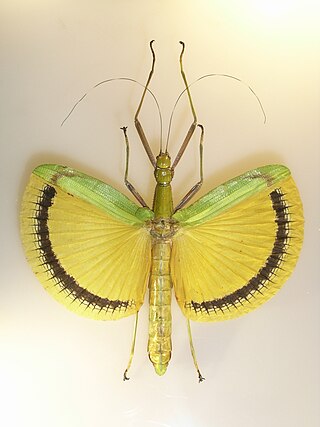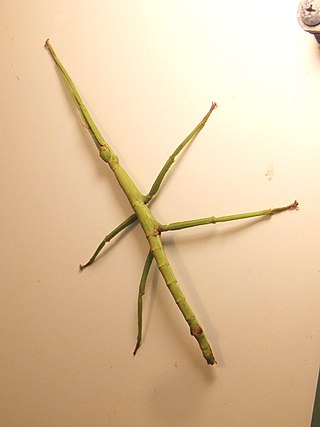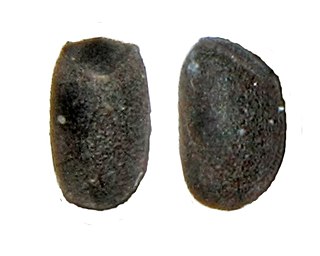
The family Phylliidae contains the extant true leaf insects or walking leaves, which include some of the most remarkably camouflaged leaf mimics (mimesis) in the entire animal kingdom. They occur from South Asia through Southeast Asia to Australia. Earlier sources treat Phylliidae as a much larger taxon, containing genera in what are presently considered to be several different families.

Necrosciinae is a subfamily of the stick insect family Lonchodidae, with its greatest diversity in South-East Asia.

Pharnacia is a tropical Asian genus of stick insects in the family Phasmatidae and subfamily Clitumninae. Some species formerly placed in this genus have been reassigned to Phobaeticus.
Asceles is a genus of stick insects in the tribe Necrosciini. Some of the species of Asceles have a distribution in Malaysia and Singapore.

Bacillidae is a stick insect family in the order Phasmatodea and the suborder Verophasmatodea.

The Heteropterygidae is a family of stick insects belonging to the suborder Euphasmatodea. Species can be found in Australasia, East and Southeast Asia. About 150 valid species have been described.

The Obriminae are the most species-rich subfamily of the Phasmatodea family Heteropterygidae native to Southeast Asia. It is divided into two tribe.

Datamini is the only tribe within the subfamily of the Dataminae from the order of the Phasmatodea. The representatives of this subfamily are on average not as large as those of the other two subfamilies belonging to the family of Heteropterygidae.

Heteropterygini is the only tribe within the subfamily of the Heteropteryginae. With 19 representatives described, this subfamily includes the fewest species of the three subfamilies, but includes the largest and most striking species of the family.

The genus Dares, which is mainly native to Borneo, combines relatively small and mostly dark-colored Phasmatodea species.

Hoploclonia is the only genus of the tribe Hoplocloniini and brings together relatively small and darkly coloured Phasmatodea species.

The Obrimini are the most species-rich tribe of the Phasmatodea family of the Heteropterygidae native to Southeast Asia.

Eubulides is a stick insect genus native to the Philippines.

Theramenes is a genus of medium-sized stick insects in the tribe Obrimini, which is native to the Philippines and to the Indonesian Talaud Islands.

The Cladomorphinae are a subfamily of stick insects in the family Phasmatidae. This taxon is particularly well represented in the Neotropical region, but records also exist for Madagascar, Java and the Maluku Islands.
Hermarchus leytensis is a species of stick insect in the order Phasmatodea. It is endemic to the Philippines.
Orestes ziegleri is a species of stick insect native to Thailand.

Heterocopus is a monotypic stick insect genus, containing Heterocopus leprosus as the only valid species.

Stenobrimus is a genus of medium-sized stick insects native to the Philippines.

Tisamenus ranarius is a stick insect species (Phasmatodea), in the family of the Heteropterygidae native to the Philippines.















